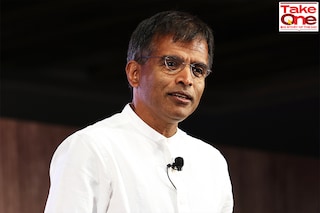I don't see Zomato's value dramatically shifting from Rs 35 per share: Aswath Da...
The dean of valuation on why he doesn't see the food delivery company's fair value materially change and how 'numbers' flow from the 'story' in investing


After sinking close to 60 percent since listing, over the past three months, Zomato’s stock price has been going up, and it hit a 52-week high of Rs 105 per share on Monday. The food delivery company reported a first-ever net profit in 15-years of Rs 2 crore in the previous quarter. In the last few months, several global brokerages have revised their rating to ‘buy’ and ‘outperform’. Some analysts, to explain the renewed confidence, point out that Zomato has a long runway for customer acquisition and revenue growth.
But how has the narrative shifted? And does it materially alter the value of the business?
Valuation guru Aswath Damodaran valued Zomato at Rs 35 apiece in July 2022 and he doesn’t see the value dramatically shifting. To explain why, in part-3 of a multi-part series, Damodaran, professor of finance, NYU Stern School of Business, underlines the importance of blending stories with numbers when valuing a company. Edited excerpts from the interview on Forbes India Pathbreakers in August:
And that"s, I think, the key. Unless the story shifts, your value is not going to change dramatically. What could cause my story to shift? Well, if Zomato shows evidence that it can actually make money on grocery deliveries, that"s a huge business. Then I"d be inclined to go back and revisit my story and valuation. I"m not stuck on my story and valuation. One of the biggest dangers in investing is falling in love with your own story for a company. In which case, you refuse to look at the data because the data might contradict your story.
***For context, in July 2021, Damodaran had valued Zomato at Rs 41 apiece. “Zomato"s business model is neither innovative, nor groundbreaking, resembling other online food delivery companies in other parts of the world. The allure to investors comes from Zomato"s core market in India, and the potential for growth in that market," he wrote on his personal blog. “The Zomato story, or at least the upbeat version of it, is that the Indian food delivery/restaurant market will grow, as Indians become more prosperous and have increased online access."
A day later, the food delivery platform listed close to 50 percent above its price band of Rs 72 to Rs 76 at Rs 115 per share. But within six months, it shed its listing gains. A year later, in July 2022, it sunk to around Rs 41 per share and traded below its IPO price for most of last year. In fact, Damodaran, in July 2022, based on a revised evaluation, slashed the company’s value per share to Rs 35.
First Published: Sep 22, 2023, 10:46
Subscribe Now